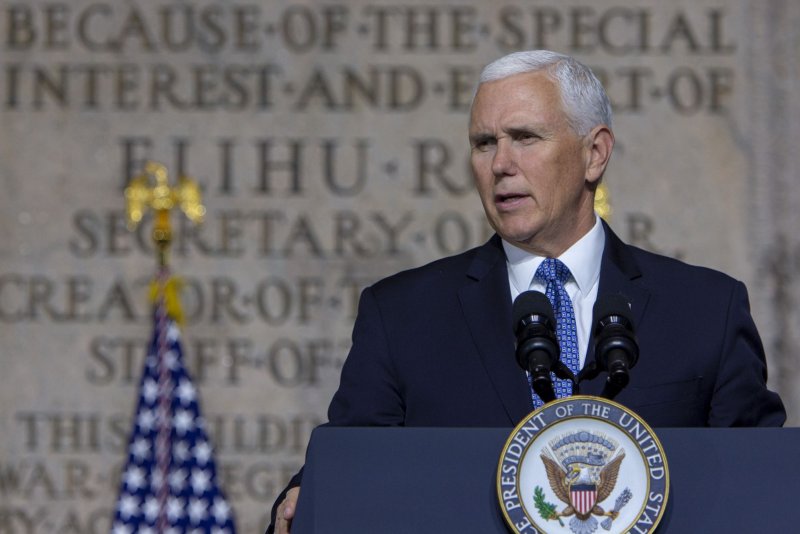1 of 4 | Vice President Mike Pence speaks at the National Space Council Meeting at the National War College at the Defense University at Fort McNair in Washington, D.C., on October 23, 2018. Photo by Tasos Katopodis/UPI |
License Photo
Oct. 23 (UPI) -- Vice President Mike Pence told the National Space Council on Tuesday that the administration plans to launch the United States Space Force, the nation's sixth military branch, by 2020.
Pence said President Donald Trump will present a new budget to Congress in early 2019 that will carve out space in the National Defense Authorization Act to fund the new branch.
Members of the council at the meeting also shared recommendations on how to establish the space force, including ideas for commerce, various launch and operational regulations and other concerns related to pushing forward American interests in space activity.
One piece of the plan includes establishing a new space combatant command to establish a chain of command for the new branch once the next budget and NDAA have been passed by Congress. The Secretary of the Defense will then be expected to create a joint organization to detangle regulation and speed up space technology development.
The National Space Council and National Security Council will also be expected to review current space operational authorities and explore changes to create future guidance to give more flexibility to war fighters.
"We will forge a new era of peace through strength in outer space," Pence said. "President Trump has stated forcefully a truth that the leaders of the National Defense University have long understood: That space is a war fighting domain, just like the air, land and sea, and America will be just as dominant there as we are here on earth."
The move follows a June announcement from Trump to launch the department as one method of addressing concerns about possible future threats from Russia and China.
Trump also wants to capitalize on the economic benefits of space exploration.
To help with this, he tapped Elaine Chao, secretary of the Department of Transportation, to propose new ways for the government to speed up the regulatory process for space flight.
The Department of Transportation has considered requiring only a single license for all types of commercial space flight launch and reentry. It will also consider loosening requirements for commercial space launches from federal sites. Chao said these recommendations, along with other efforts, would help reduce red tape while maintaining safety.
Chao pointed to the bump in commercial space launches since Trump took office as evidence of its growing popularity in the U.S. In 2017, 29 licensed and permitted launches occurred on American soil. In fiscal 2018, that number ticked up to 35, according to Chao.
A Space Foundation report placed the global space economy at nearly $4 billion in 2017. In that time, about 57 percent of global government space spending and 65 percent of all space launches came from the U.S.
"American launch innovators, operators and workers have captured a significant share of this market," Chao said. "The Department of Transportation is doing all we can to maintain this forward momentum."















